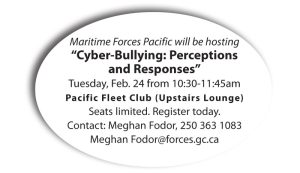How to deal with a new kind of bullying
By Lookout on Feb 16, 2015 with Comments 0

To kick off this year’s anti-bullying campaign, the Maritime Forces Pacific Health and Wellness Team (MHWT) will be hosting “Cyber-bullying: Perceptions and Responses,” a talk by Dr. Brett Holfeld, a cyber-bullying researcher at the University of Victoria.
This free event will be held on Tuesday, Feb. 24 from 10:30-11:45 a.m. at the Upstairs Lounge of the Pacific Fleet Club and is open to the Defence Community and their families.
Bullying is not a new phenomenon, but cyber-bullying – the use of the internet to harass, embarrass and/or threaten others – is. In contrast to other methods of bullying, it can occur 24 hours a day and is often permanently available once on the internet.
Public Safety Canada reports that this relentless form of bullying can compound feelings of fear, humiliation, social isolation and other negative emotions.
“Because the material can be posted online at any time of the day or night, and can reach an unlimited audience, it can be more distressing than traditional forms of bullying,” explains Dr. Holfeld.
Not only has cyber-bullying altered the experience of victims, but it has also changed the profile of bullies.
Hiding behind technology, bullies do not witness their victim’s reaction, which makes it easier for them to become more aggressive. A 2008 cyber-bullying survey by the University of Toronto found that 74 per cent of participants who admitted to cyber-bullying others had not bullied others in person, suggesting that this passive form of bullying has increased the number of people willing to target others. For more information on this study, visit http://www.governmentevents.ca/ypo2008/presentations/634.pdf .
Although young people are the most common targets of cyber-bullying, adults are also affected. The Canadian Institute of Health Research reports that 40 per cent of Canadian workers experience bullying on a weekly basis. This workplace bullying can lead to an increase in absenteeism, turnover and stress as well as a decrease in productivity, motivation and customer confidence, costing thousands of dollars each year.
So what can you do if you’re the victim of cyber-bullying? First, confront the individual either directly or indirectly and ask them to stop the behaviour. If this does not resolve the issue, reach out to your supervisor to intervene. Remember to keep a record of any cyber-bullying activity for evidence and do not respond to provocation.
“Unfortunately, there is no one way to respond to cyber-bullying that will work in every instance,” says Dr. Holfeld. “Each situation is unique because of the many different ways that cyber-bullying can be committed.”
The complexity of cyber-bullying is something Dr. Holfield will discuss in greater depth during his talk, which is made possible through the MARPAC Health and Wellness Strategy. Resources can be found at http://esquimalt.mil.ca/main/e/personalHelp.htm
Seats at the event are limited. To register, contact Meghan Fodor at 250-363-1083 or at Meghan.Fodor@forces.gc.ca.
Maritime Forces Pacific will be hosting
“Cyber-Bullying: Perceptions
and Responses”
Tuesday, Feb. 24 from 10:30-11:45am
Pacific Fleet Club (Upstairs Lounge)
Seats limited. Register today.
Contact: Meghan Fodor, 250 363 1083
Meghan Fodor@forces.gc.ca
Katelyn Moores, Navy Public Affairs
Filed Under: Top Stories
About the Author:





